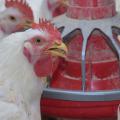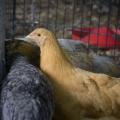Causes of pecking and cannibalism
Cannibalism is a prevalent problem in chicken and game bird flocks. It usually begins as simple pecking among the birds and escalates until it is out of control. There are many conditions that increase the likelihood that it will become a serious problem. The problem usually begins by innocent pecking during the establishment of a social order or by pulling of the feathers in certain cases. Some of the reasons for cannibalism are:
- Crowding birds - Correct by increasing the amount of space available for each bird.
- Provide plenty of feed and water - All birds should have access to feed and water at all times.
- Keep light intensity low - Bright lighting increases bird activity and cannibalism.
- Keep the house temperature comfortable - Hot house temperatures aggrivate birds and make them more irritable.
- Provide all dietary nutrients at recommended levels - Deficiencies of nutrients like methionine and salt will increase a craving for feathers and blood.
- Regularly treat birds for external parasites - Pests can stimulate birds to peck and injure the skin, resulting in cannibalistic frenzies.
- Remove all sick, weak, small, or odd colored chicks - Birds will attack and kill these chicks as a survival instinct, resulting in widespread cannibalism throughout the flock.
If the pecking and cannibalism problem can not be controlled by the recommended management practices, the last resort is debeaking. Many producers commonly remove portions of both the upper and lower beaks of chicks soon after hatching. This prevents future pecking problems. The debeaking procedure is accomplished by using a hot debeaking blade that cauterizes while cutting the beak. In young chicks, the beak is so soft that touching the beak to a hot metal blade usually removes enough beak to prevent cannibalism. Mature birds may need to have their beaks "trimmed" periodically to prevent cannibalism in older flocks.
Publications
News
STARKVILLE, Miss. -- Until an avian flu vaccine for chickens or other alternative is federally approved, commercial poultry operations in the U.S.
STARKVILLE, Miss. -- If egg prices have seemed higher than ever lately, it’s because they are, and consumers can place much of the blame squarely at the feet of the ongoing bird flu outbreak.
With highly pathogenic avian influenza, or HPAI, in the environment in Mississippi, owners of backyard flocks have to take extra steps to keep their chickens healthy.
Avian influenza poses an extremely low risk to human health and none to food safety in Mississippi, but its presence poses a risk to backyard flocks and the state’s $3 billion commercial poultry industry.







